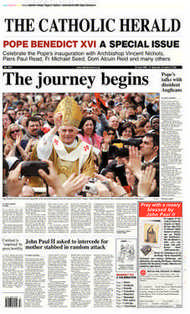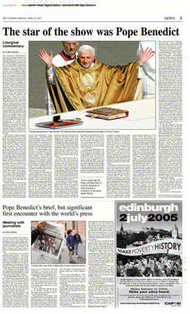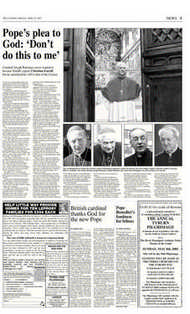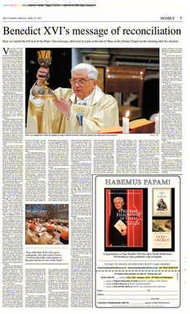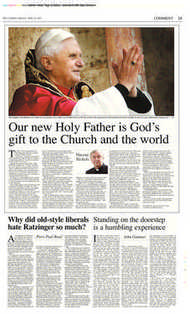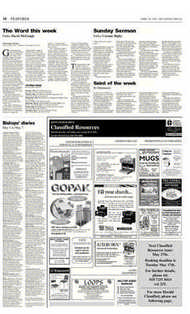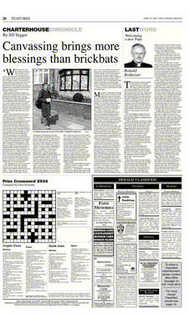Page 11, 29th April 2005
Page 11
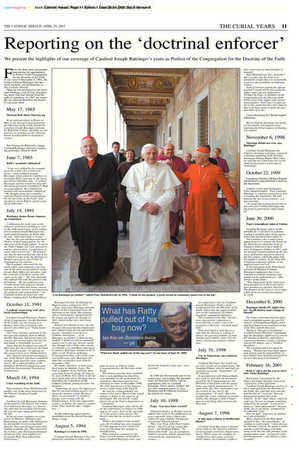
Report an error
Noticed an error on this page?If you've noticed an error in this article please click here to report it.
Tags
Share
Related articles
Secular Europe Is The Enemy, Says Ratzinger
'amato To Be Promoted, Says Report
Uneven Handhng For Opposite Rebels
Cardinal Ratzinger Appointment
Ratzinger Recovers From Alpine Fall
Reporting on the ‘doctrinal enforcer’
We present the highlights of our coverage of Cardinal Joseph Ratzinger’s years as Prefect of the Congregation for the Doctrine of the Faith
From the three short paragraphs announcing his appointment as Prefect of the Congregation for the Doctrine of the Faith, in our issue of December 4, 1981, the former Cardinal Ratzinger has featured regularly and prominently in The Catholic Herald.
Often he was portrayed as the hard man wielding a rod of iron, disciplining those who had strayed from the path of orthodoxy. In 1985, for example, he silenced Brazilian theologian Fr Leonardo Boff.
May 17, 1985
Silenced Boff shuns Marxist tag In an announcement in Rome on May 9, the Sacred Congregation for the Doctrine of the Faith, headed by Cardinal Joseph Ratzinger, forbade Fr Boff from writing, speaking at conferences or working on the editorial board of a Brazilian ecclesiastical review.
But belying his Rottweiler image, Cardinal Ratzinger showed a surprising gentleness about Fr Boff:
June 7, 1985
Boff’s ‘academic sabbatical’ “I am very edified by the example given by a man who is truly religious,” said Cardinal Joseph Ratzinger when asked to comment on Leonardo Boff’s reaction to the latest provisions regarding him...‘Cardinal Ratzinger said he would not describe the recent provision regarding Fr Boff as a punishment. He compared it instead with an academic sabbatical. “We thought about this carefully,” said the Prefect of the Congregation for the Doctrine of the Faith “and decided to invite Boff to spend a period of reflection.”
July 19, 1991
Ratzinger denies Rome rumours on resignation Celebrating his tenth year as the Church’s doctrinal watchdog as well as the 40th anniversary of his ordination Cardinal Joseph Ratzinger this week quelled rumours in Rome that he was “tired and ready to resign”.
But the 64-year-old Bavarian-born Prefect of the Congregation for the Doctrine of the Faith added: “I am in the Pope’s hands. If I were allowed to end my mission here, I would have so much other work to do.” He pointed out that he had reached the end of his second five-year term, the duration of Roman curia posts which Paul VI stipulated in his reforms...
The Cardinal, renowned for his ready smile and courteous ways but one of the most severe prefects of the former Holy Office for decades, said his criticism of modern society was “part of the job”. “My role demands this attitude but with the positive aim of helping... We are witnesses to a certain moral and religious disintegration. So I think that being critical and sometimes severe is an expression of solidarity and responsibility,” the Cardinal said in an interview with Rome’s leading daily, La Repubblica.
October 11, 1991
Cardinal ‘recovering well’ after brain haemorrhage Cardinal Joseph Ratzinger, Prefect of the Congregation for the Doctrine of the Faith, was recovering in a Roman clinic this week from what doctors described as a “brain haemorrhage”.
The clinic said the condition of the 64-year-old cardinal, born in Markl am Inn, Bavaria, had given cause for concern for several hours but that he had made a remarkable recovery.
Signs that the Cardinal was unwell had come just days before he declined “for health reasons” to officiate at the consecration of an Italian bishop.
The Church’s doctrinal watchdog is one of the busiest and most committed of Pope John Paul II’s close collaborators. He is also president of the Pontifical Biblical Commission and heads the International Theological Commission.
March 18, 1994
Chief watchdog of the faith Vaticanologist Peter Hebblethwaite profiles one of the most hated men at the Vatican, Cardinal Joseph Ratzinger.
Cardinal Joseph Ratzinger, hammer of the heretics, the Panzer who rolled over liberation theology, is a charming man and an excellent theologian. He gets his ogre image partly from his job.
In his previous existence as a professor in Munster, Tubingen and Regensburg, he dealt with theologians he did not like by reviewing them fiercely. This was all good clean stimulating academic fun. They answered his reviews, and theological dialogue advanced. One such student was Leonardo Boff, then a Brazilian Franciscan... Ratzinger became Archbishop of Munich and a cardinal in 1977.
Four years later Ratzinger became Prefect of the Congregation for the Doctrine of the Faith. His relationship to theologians changed utterly. No longer an equal, he became in their regard judge, jury and executioner.
Instead of a hostile review, the theologian who incurred his displeasure now risked losing his job and forfeiting his “mandate to teach as a Catholic theologian”....Can Ratzinger go further? I think he has peaked. A good second-in-command cannot rise to the top. Strictly speaking, though with a Pope who considers himself a second Moses this hardly matters, Ratzinger should not be in office at all. Prefects of Roman Congregations have a five-year term renewable once only. Ratzinger finished his second five-year term in November 1991.
He ought, therefore, to have gone back home to Munich. A pity. The man is happier doing theology than censoring his peer-group. So long as he stays in Rome he is likely to devote most of his time not to theology but to defending the Catechism of the Catholic Church, produced under his auspices.
“Sometimes he gives the impression that he can find nothing good to say about the modern world. He has a theory to account for its badness. Europe went wrong with the Enlightenment. It became impossible to know or define the good in a public sense. Thus truth became “subjective...” As the following extract shows, sometimes even the Herald has got things wrong.
August 5, 1994
Ratzinger to retire in 1996 Cardinal Joseph Ratzinger has confirmed his intention to retire early from his post as Prefect of the Congregation for the Doctrine of the Faith.
The longest-serving curia cardinal, who is now fulfilling his third fiveyear mandate as the spokesman for orthodoxy, Ratzinger said he was planning to retire in November 1996, the 15th Anniversary of his Vatican service under Pope John Paul II.
He said he would probably not return to his native Bavaria but would remain in Rome in his capacity as theologian. He stressed he would always be at the Pope’s disposition as “consultant”.
Cardinal Ratzinger, who will be 69 on his anniversary as Prefect in 1996 and so six years short of the age limit of 75 for active curia service, has always said that he wished to retire early....
While a key figure in this pontificate, the Cardinal has also engaged in what appeared to be veiled criticism of John Paul II’s attitude to beatifications.
When asked to comment on the Pope’s record number of beatifications, Cardinal Ratzinger once said he felt the Church’s altar was “overcrowded”.
In 1998 the Herald took part in the controversy surrounding the apostolic letter Ad Tuendam Fidem, and its explanatory note by Cardinal Ratzinger. News stories, readers’ letters and comment pieces by Sara Maitland and R J Barrett continued the debate for weeks.
July 10, 1998
Pope: ‘You have been warned’ Liberal Catholics in Britain reacted angrily this week to the publication of a new apostolic letter, which they claim will gag Catholic theologians who favour Church reform.
They view Pope John Paul’s latest decree – the first of two issued this week – Ad Tuendam Fidem (“To Defend the Faith”) as an attempt to suppress growing debate, particularly concerning the ordination of women.... An explanatory note by Cardinal Joseph Ratzinger, Prefect of the Congregation for the Doctrine of the Faith, stated that the papal prohibition on the ordination of women should be considered definitive.
The Cardinal wrote that “the doctrine that priestly ordination is reserved only to men” was to be treated as a doctrine “set forth infallibly”.
Liberal Catholics took this as a sign that the Vatican is seeking to silence the growing number of seminarians and Catholic university lecturers who favour women’s ordination.
July 31, 1998
I’m no bogeyman, says enforcer Ratzinger Cardinal Ratzinger has struck out at critics of the recent papal letter, Ad Tuendam Fidem, who he said had singled him out as the “bogeyman” of the Vatican.
In an interview with Vatican Radio this week he said that the document issued by the Congregation for the Doctrine of the Faith with the papal letter was widely misinterpreted. “I must stress that this commentary was not written by me, but by the Congregation,” he said. “But what escapes me is this constant personalisation, this attempt to find a bogeyman in everything that concerns the Holy See.”
August 7, 1998
Is this man a threat to intellectual liberty?
Cardinal Josef Ratzinger is regarded by some as the Vatican’s enforcer of increasingly restrictive Papal utterances. Where some see attempts at clarification others fear a bid for mind control. Are Catholics right to fear restrictions on their freedom of thought?
Sara Maitland says Yes...honestly I have no idea why the Pope is so absolutely certain that it is not possible to discuss the possibility of ordaining women.
Even if I tried to explain the official position I would still be discussing the subject and I am not supposed to. Perhaps the Pope, or members of the Congregation for the Doctrine of the Faith, never have supper with curious non-Catholics. Their loss, I would say, but it does mean that they don’t have to deal with these issues in quite the way that many of us do...
Canon theologian R J Barrett argued differently: Recent Vatican statements are juridical documents, not languid essays depicting the broad expanse of theological enquiry.
November 6, 1998
Marriage debate not over, says Ratzinger Cardinal Joseph Ratzinger, the Church’s doctrinal watchdog, surprised a birthday gathering of the German theologian Johann Baptist Metz when he said that the Church has not yet finished its discussion on the issue of remarriage.
October 22, 1999
Conspiracy theorists Michael Baigent and Richard Leigh published a book on the Inquisition.
Catholic writer and broadcaster Peter Stanford added: “Poor Cardinal Ratzinger is somehow presented as if he is running the Inquisition. The link between the two is non-existent – it is just nonsense.
“It would take a great deal for me to feel sorry for Cardinal Ratzinger, but this book is particularly empty-headed.”
June 30, 2000
Pope’s triumphant vision of Fatima Cardinal Ratzinger said it would probably be “a let-down to someone reading it carefully after all the speculation that has been made about it”.
The Cardinal, who is said to have opposed moves to release the details of the Third Secret which Our Lady of Fatima is believed to have made to three Portuguese children in 1917, said the message instead summed up the violence, destruction and persecution of the last century, which the popes had all sought to counter. At the same time it held out a message of hope, of triumph of good over evil...
In his exposition of the Third Secret released on Monday, Cardinal Ratzinger emphasised that it was couched in symbolic language and should not be understood as a “film preview of the future”.
“The whole point of the vision is to bring freedom on to the scene and to steer freedom in a positive direction. The purpose of the vision is not to show a film of an irrevocably fixed future,” he wrote.
December 8, 2000
Ratzinger attacks EU rights charter: ‘It will destroy man’s image of himself’ The Pope’s doctrinal chief has delivered a broadside against the new EU Charter of Fundamental Rights which had been hoped to be enshrined as law at the Nice summit this week.
Styling it “Europe’s Constitution”, Cardinal Joseph Ratzinger complained that the document, approved at a recent EU meeting in Biarritz, and which is expected to become a source of inspiration for EU judges, was a “Godless” document...
The Cardinal ended his attack by asking: “Would it not have been opportune if God, and the responsibility we have before God, had been anchored in the new European Constitution?”
February 16, 2001
Rock n’ roll is not the way to salvation, warns Ratzinger Rock music was painted by the Pope’s doctrinal chief this week as an “expression of base passions”.
Cardinal Joseph Ratzinger, prefect of the Congregation for the Doctrine of the Faith, also said that rock concerts had become an “anti-cult” that was being pitted against that of the Church... As for “pop” music, which he said was “by now no longer something endured by the people”, it was nevertheless a “mass phenomenon” because of the way it was being “produced on an industrial scale”.
This, he said, “must now be defined as a cult of banality”.
Music inspired by the Holy Spirit seemed to have “few possibilities” of existing in a rock music “where the ego has become a prison, the spirit, a chain, and the violent breaking with both seems to be the one, true promise of liberation whose taste – at least for a few fleeting moments – one believes to have savoured”.
blog comments powered by Disqus


